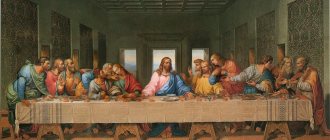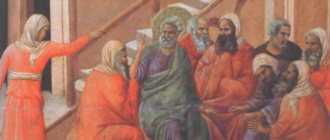Attitude towards original sin
According to the Christian faith, every person is born with original sin and must atone for it throughout his life. The Apostle Paul wrote: “Sin came into the world through one man... And since the sin of one led to the punishment of all people, then the right act of one leads to the justification and life of all people. And just as the disobedience of one made many sinners, so through the obedience of one many will be made righteous” (Rom. 5:12, 18-19). According to the Jewish religion, all people are born innocent, and to sin or not to sin is only our choice.
General characteristics of Judaism
What similarities and differences do Judaism and Christianity have? To understand this, a general description of Judaism is necessary. This is not only a religious, but also a national, ethical worldview. Its bearer is the Jewish people.
Jews is an ethno-religious term. It denotes adherents of Judaism and anyone who is Jewish by mother. In ancient times, this was the designation for the Israelites from the clan of Judah. However, after the Babylonian captivity of Israel, they became the only representatives of their people. The center of the religious life of the ancient Jews was the Jerusalem Temple. It was destroyed in the 1st century AD. during the suppression of the Jewish uprising against Roman power. After this, the Jews once again scattered throughout the land.
Menorah - a ritual seven-branched candlestick, one of the symbols of Judaism
Previous Jewish dispersals occurred periodically throughout the first millennium BC. They were caused by the repeated conquests of the Jews by other peoples. For example, in the 8th century BC. The Assyrian conquest took place, and in the 6th century the Babylonian conquest. And from the 1st century BC. Judea was under Roman control and Jews settled throughout the empire. It was the national religion that played the most important role in their self-preservation as an ethnic group.
Ways to atone for sins
Christianity believes that Jesus atoned for all human sins with his sacrifice. But every Christian at the same time bears personal responsibility for his actions before God. You can atone for sins by repenting before the priest as a mediator between the Lord and people.
In Judaism, a person can achieve God’s forgiveness only through his deeds and actions. Jews divide all sins into two types: violations of God's commandments and crimes against another person. The first are forgiven if the Jew sincerely repents of them. But at the same time, there are no intermediaries between God and man, as in Christianity. In the event of a crime against someone, a Jew must beg forgiveness not from God, but exclusively from the one whom he offended.
Is Christianity an independent religion or a Jewish sect?
Judaism considers Christianity to be its derivative religion, designed to introduce other peoples to the basic elements of the Jewish faith. Christianity views Old Testament Judaism as a divinely revealed preparatory step to the teachings of Christ:
“The Law given through Moses is a symbolic, consisting of hints, a contraction of future grace, announcing in images the fulfillment of future truth” (St. John Chrysostom, “Word for Easter”).
Why didn't the Jews accept Christianity? This question is not entirely correct. After all, some Jews accepted the Savior and became Christians. But there were also those who deviated from the Truth. Instead of going after the long-awaited Messiah, they crucified Him. Why didn't some Jews see Jesus as the Messiah? Here is what Metropolitan Anthony (Khrapovitsky) says about this:
“The Old Testament sacred writers, predicting a bright future for Israel and even all humanity, had in mind spiritual, and not physical, benefits, contrary to the interpretation of later Jews... However, the Jews contemporary to the Savior did not want to take such a point of view and intensely thirsted for themselves, their tribe, external contentment and glory, and only the best of them understood the prophecies correctly.”
How the Jews Didn't Recognize the Messiah
The Savior denounced some of the Jewish high priests for their hypocrisy, pride and following only the external ritual law, and not the main moral one:
“Woe to you, scribes and Pharisees, hypocrites, because you tithe mint, anise and caraway seeds, and have abandoned the most important things in the law: judgment, mercy and faith; This ought to be done, and this ought not to be abandoned” (Matthew 23:23).
Jesus Christ pointed out that the Pharisees abolished God's commandments and gave preference to the commandments of men:
“You, having abandoned the commandment of God, adhere to the tradition of men, the washing of mugs and cups, and do many other things like this... Is it good that you cancel the commandment of God in order to keep your tradition? (Matt. 7:8-9).
The Savior told the people:
“Therefore whatever they command you to observe, observe and do; But do not do what they (the Pharisees) do, for they say and do not” (Matthew 23:2).
So, it was spiritual poverty and pride that did not allow many servants of the Mosaic Law to see the Messiah in Christ.
Thus, the new Jewish faith is not fully the same that was given to the Israelites through the Old Testament prophets. Modern Judaism is to a large extent the fruit of human inventions and the influence of various magical and superstitious movements (Kabbalah, etc.).
The first Jewish Christians continued to fulfill the requirements of the Law of Moses. However, these two religions were rapidly moving away from each other. Formally, the final break between Judaism and Christianity was recorded at the First Council of Nicaea in 325.
Attitude to other world religions
Christianity claims that only those who believe in the one true God will go to heaven after death. In turn, the Jews believe that to get into Paradise it will be enough to keep the seven basic commandments received by Moses from God. If a person follows these laws, he will go to heaven regardless of what religion he professes - if he is a non-Jew, then he is called a righteous non-Jew. True, Judaism is loyal only to monotheistic religions, but does not accept pagan teachings due to polytheism and idolatry.
Modern Jews
According to 2022 statistics, there are 15 million Jews in the world. About 40% of Jews today live in the USA and Canada, 9% in Europe. 45% of them live in Israel. In this country, Judaism does not have the status of an official religion, but it is not separated from the state. For example, some Israeli laws are based on traditional Jewish law. Issues such as marriage, divorce, death are handled only by religious institutions. The Jewish Sabbath is a day of rest in Israel. Holidays also follow Jewish tradition.
The interpreters of Jewish law and the heads of communities are called rabbis. Jewish prayer gatherings are called synagogues. The symbol of Judaism in recent centuries is the six-pointed Star of David. Since ancient times, the symbol of the Menorah has been used - a seven-branched candlestick from the destroyed Jerusalem Temple.
Destroyed in the 1st century AD the temple was already the second in the history of the Jewish people. In its place stood the First Temple, built by King Solomon a thousand years before the birth of Christ. It was destroyed in the 6th century BC during the Babylonian invasion. However, the religious building was soon restored and existed for more than 500 years. Today there is a Muslim mosque in its place. From the Second Temple to our times, only a few ruins have survived (“Wailing Wall”). The Jews believe in the revival of their main shrine. They believe that the Third Temple will become a spiritual center not only for Jews, but for all humanity.
Faith in one Savior
As you know, in Christianity Jesus is revered as the Son of God, who alone can lead people to God: “All things have been handed down to Me by My Father, and no one knows the Son except the Father; and no one knows the Father except the Son, and to whom the Son wants to reveal it” (Matthew 11:27). Accordingly, Christian doctrine is based on the fact that only through faith in Jesus can one come to God. In Judaism, a person who does not adhere to this creed can also approach God: “God is with those who call on Him” (Ps. 146:18). Moreover, God cannot be represented in any form; he cannot have an image or body.
Judaism and Christianity: common features
These religions have a common Old Testament basis. In this regard, many want to understand the topic “Judaism and Christianity: similarities and differences.” It is necessary to understand that Christianity arose in the context of Judaism. The Savior and the apostles were Jews both by birth and upbringing. Christianity was perceived by other Jews as one of the Jewish sects.
These religions are monotheistic. They teach about one God who created man in his own image and likeness. The Almighty is not only the Creator, but also a loving and helping Father for people. The dialogue between man and God is conducted throughout life, both at the individual level and at the level of the entire people and humanity as a whole.
Judaism and Christianity teach about man as a free, immortal spiritual being, called to spiritual perfection, knowledge of God and salvation. Also, Jews and Christians believe in a general resurrection of the dead at the end of time.
Judaism and Christianity share a common concept of church service to God. Christian worship has been greatly influenced by Judaism. For example, the church reading of the Holy Scriptures, psalms, as well as some prayers (“Our Father”) and prayer formulas (Amen, Hallelujah, Hosanna) were borrowed.
The Sacraments of Baptism and the Eucharist have Jewish origins. Thus, since ancient times, the Jews have had a rite of ritual cleansing through washing, called twila. The Eucharist includes such traditional Jewish elements as the breaking of bread and the cup of wine. They are used to celebrate the Jewish Passover (the day of remembrance of the Exodus of the Jews from Egypt). The sacrament of the Eucharist was established by Jesus at a festive dinner with the apostles (Last Supper), which took place precisely on the occasion of Passover.
Attitude to worldly life
Christianity teaches that the very purpose of human life is to prepare for the subsequent posthumous existence. The Jews see the main goal in improving the already existing world. For Christians, worldly desires are associated with sin and temptation. According to Jewish teaching, the soul is more important than the body, but the worldly can also be related to the spiritual. So, unlike Christianity, in Judaism there is no concept of a vow of celibacy. Starting a family and procreation is a sacred matter for Jews.
The same attitude applies to material wealth. For Christians, the vow of poverty is an ideal of holiness, while Jews consider the accumulation of wealth to be a positive quality.
Judaism and Christianity: originally from the Old Testament
The Tanakh is the holy book of Judaism, largely corresponding to the Christian Old Testament, and also became the basis for the birth of Islam. It tells about the creation of the world and people by the Almighty, about the Divine law, as well as about the fate of God's chosen Jewish people.
The most important part of the Tanakh is the Torah (Pentateuch of Moses). It includes the books of Genesis, Exodus, Leviticus, Numbers and Deuteronomy, received by the prophet from the Most High on Mount Sinai. The Pentateuch tells of events from the beginning of time to the death of Moses.
In the 3rd century AD, Jewish theologians compiled the Mishnah, a book of commentaries on the Torah. Later, the book Gemara was created, which is a profound commentary on the Mishnah. These two texts together make up the Talmud. All aspects of the life of a devout Jew, including secular ones, are regulated by the Torah and Talmud. For example, a Jew must have a beard, locks of hair at the temples (sidelocks), wear a small round headdress (kippah), and also undergo the rite of circumcision.
The Talmud teaches that sins can be blotted out through strict adherence to all religious injunctions. Rituals in Judaism are elevated to the level of dogma. Therefore, the Jews pay exceptional attention to their fulfillment.
New in blogs
Ilya
Jaffa, Israel
Answered by Rabbi Ovadia Klimovsky Hello, Ilya!
Let's look at the question from three angles: 1. What are the practical consequences of the development of Christianity, 2. What does this religion look like from a philosophical point of view, 3. What follows from the above in the sense of Alakha.
1. Let's start with the good (oddly enough!) - Christianity played an important role in the fate of many peoples, moving them away from paganism. True, these peoples never came to monotheism (see point 2). The Rambam writes that the conquest of most of the world by Christianity and Islam led to the spread of the ideas of the Torah, although distorted, and the knowledge of the coming of the Moshiach and the final Deliverance. When these events happen (probably in our days!), humanity, getting acquainted with the Truth, will discover that most of its postulates are already familiar to everyone.
True, there is not much merit in this for those who spread their faith throughout the world with fire and sword, and along the way, all sorts of crimes were committed, mainly robbery and robbery, not to mention the destruction of entire Jewish communities. The “religion of love” watered the land of Europe with Jewish blood for more than one century, and their ideologists consistently instilled deep contempt and hatred for the Jewish people into the consciousness of the masses. Even those who seemed to sympathize with the persecuted Jews added a dose of poison to their sympathy (see the analysis of the story told by the great Russian writer Leskov at https://toldot.ru/rus/articles/art/2161). Details, I believe, are unnecessary, refer to history.
2. From the point of view of the Torah, Christianity is a type of idolatry, since it deifies the person, the founder of this religion - Yeshu. A student of the famous sages of the Second Temple era, he was expelled by his teacher for indecent behavior. Offended, he began to fool people, using his knowledge of the Torah, open and secret, and persuading them to follow him, to the “New Truth.” That is, leave the Torah. He was executed, according to some sources, by the Sanhedrin, according to others - by the Romans. He was posthumously declared "resurrected", the Messiah, the son of G-d (in fact, one excludes the other). You can read more about exposing the false premises on which Christianity is built in books dedicated to this. Several such books have been published in Russian in Israel.
The presence of icons, “saints,” “mothers,” and “sons” to which Christian prayers are addressed firmly secures this religion’s status as “avodah zara,” or idolatry. And even those movements that do not have these elements allow “shituf” - they attribute deities to the Almighty, the so-called. "trinity". This contradicts the Unity of the Creator, declared by the Torah, and is not acceptable for a Jew. 3. Hundreds of thousands of Jews throughout history preferred death, exile and humiliation to the wealth and honor offered to them for baptism. The Sanhedrin treatise clearly defines the worship of idols as one of the three prohibitions that a Jew has no right to transgress, even on pain of death. Therefore, it is strictly forbidden to be baptized, even for appearances. You should also not go into churches, and it is advisable not to use them as landmarks to mark the area (“meet me at the church of such and such mother”, etc.)
In conclusion, we note that despite all the sharp, castigating definitions that we give to Christianity, in our personal attitude towards Christians, as well as towards all people, our sages taught us by their own example to be polite and friendly. Do not cultivate hatred towards “others” who are not like us (this does not mean making concessions to idolatry and condoning its planting in the Land of Israel). The path of the Torah is different - to sanctify the Name of the Most High with a good attitude towards everyone (except for the villains, of course). Respect all the creations of the Almighty, especially people. To be grateful to those who, despite the general atmosphere of hatred, came to the aid of the oppressed and doomed Jews. Of course, there were Christian priests among them, but they acted like human beings not because they were priests, but in spite of this. The official attitude of the church towards Jews is known. The fig leaves of “reconciliation” and “removal of guilt” of recent decades cannot cover centuries of history. Even if we agree with the official Christian version of the death of their “Teacher,” this would not give any moral right to do what they did for two thousand years. We must assume that the majority of Jews still have enough sense to think about the above, and not to succumb to today’s sweet smiles of missionaries. After all, the existence of the Jewish people proclaiming “Hear, O Israel, there is one G‑d!” - the best answer to everyone who over the centuries tried with carrots and sticks to prevent the Jews from remaining faithful to the Creator
—————————
Judaism
The first printed edition of the Talmud appeared in 1520 in Venice, the second in 1550 in the same place.
Both publications put the rabbis in great difficulty: it became no longer possible to hide the true essence of Jewish religion, morals, life and politics. When previously Christian scholars or Jews who converted to Christianity pointed out the immoral or criminal teachings of the Talmud and cited extracts from it, it was possible to get away with citing the translator’s errors or the evil intent of the copyist, but then it was no longer possible to use such methods.
In the third edition of the Talmud, printed in 1581 in Basel, the censor deleted the most malicious passages against Christ, Mary and the church.
But the Jews reprinted the crossed out blasphemies separately and inserted them into the appropriate places in the books they owned. This sparked protests against such circumvention of the law. The rabbis found it more convenient not to provide weapons for attacking the “chosen people.” Therefore, the Supreme Council of Rabbis in Krakow in 1631 decided to remove the most objectionable passages from all subsequent editions of the Talmud.
Here is the text of this decree: “Under pain of supreme excommunication, we order that nothing be printed in future editions of the Mishnah and Gemara (the names of the two parts of the Talmud) that relates, good or bad, to the acts of Jesus of Nazareth. We therefore order that the places where the question concerns Jesus of Nazareth be left blank. A circle like this - O - placed at this place will serve as a warning to rabbis and teachers that this place should be taught to young people exclusively orally. If this precaution is observed, the learned Nazarenes (Christians) will have no reason to attack us on this issue.” (Drach, Harmonie entre leglise et la synagoge, 1, 167).
This decree was strictly observed in all subsequent editions of the Talmud. It is very significant that the excluded blasphemous passages are not condemned or prohibited from teaching, but, on the contrary, they are ordered to be taught orally!
Currently, there are complete translations of the Talmud in English, German, French and Spanish. (As for the edition in Russian, which was recently reprinted in our country, it, according to experts, does not deserve attention, because the translator omitted from his work everything that seemed to him harmful to Judaism, and softened and even changed a lot. In other words, this publication is a simple fraud, carried out specifically to fool the goyim.) However, in order to familiarize the general public with the contents of the Talmud, in our opinion, we can completely limit ourselves to quotes and brief explanations.
While the Jews pretend to the rest of the world to believe in the Old Testament, the real essence of the Jewish creed is not it, any more than the books of Moses are, that is the Talmud. There are several branches of the Jewish religion, such as Orthodox, Reform, Liberal, Conservative, Sephardim, Ashkanazim, Zionist, etc., but they all use the Talmud in their synagogues, just as different branches of Christians use the Bible.
The Talmud consists of 63 books and 524 sections and is often published in 18 large volumes. It was written by rabbis between 200 and 500 AD. Basically it contains a set of Jewish laws both in their relations among themselves and in the relations of Jews to non-Jews (goyim).
As you know, Jewish believers did not recognize the Savior (Messiah) in Jesus Christ and continue to this day tensely await his coming.
The Messiah is presented in the Talmud as the most ferocious world ruler who will crush the goyim under the wheels of his chariot, and convert the survivors into slavery and give their property to the Jews.
“As soon as the Messiah comes, all the goyim will become slaves of the Jews.” (Erubin 43 b).
“Only Jews are worthy of the name of people, but goyim, descended from evil spirits, have reason to be called pigs.” (Jalkut Reubeni 10 b).
“It is forbidden for a goy to return what they have lost; he who returns to a goy what they have lost will not find mercy from God.” (Sanhedrin 76 b; Baba Kamma 13 b; Sepher Mizvot, Gaddol 132, Col 3).
77. Rabbi Eli advises his flock this way: “When people want to sin, let them go to one place where no one knows them, and let them dress in black, so as not to openly shame Jehovah.” (Maed Katon)
81. “All nations, except the Jews, came from an unclean spirit and should be called beasts.”
“It is permissible to deceive a goyim. But if you sell something to your neighbor (i.e., a Jew) or if you buy something from him, then you are prohibited from deceiving him.” (Baba Mezia 61 a. Bechoroth 13 b).
20. Schulchan Aruch, Choszen Hamiszpat 388: “All property of other nations belongs to the Jewish nation, which thus has the right to enjoy everything without restraint.”
21. Tosefta Aboda Zara VIII, 5: “How to define the word robbery? A goy is forbidden to steal, rob, or take women and slaves from a goy or Jew. But a Jew is not forbidden to do all this in relation to a goyim.”
22. Seph. Jp., 92, 1: “God gave the Jews power over the property and blood of all nations.”
Simeon Haddarsen, fol. 56-D: “When the Messiah comes, each Jew will have 2800 slaves.”
“The commandment “thou shalt not kill” means that one must not kill a son of Israel, and the goy and the heretic are not the sons of Israel.” (Jad Chag. Hilch Rozerch., Hilch Malachim).
“A Jew can throw a piece of meat to a dog, but he should not give it to a Christian, since a dog is better than a Christian.”
“Passing past the ruined temple of the goyim, every Jew is obliged to say: “Glory to you, Lord, that you have uprooted this house of idols.”
“A Jew always has the right to attack a Christian and kill him with an armed hand.
The Jews, who, thanks to the position they occupy, would have the opportunity to do this, are urgently obliged to publicly execute all Christians under one pretext or another.”
“Kill the best of the goyim.” (Kidduschim 82 a; Sophrim 15; Mechlito C. Bechallam).
“The goy who studies the Talmud and the Jew who introduces him to the Talmud deserve death. A Jew who writes a translation from the Talmud or from the writings of the rabbis is considered a traitor and is secretly killed.” (Sanhedrin 59 a, Schaar Teschub 78 b).
“It is forbidden to feel pity for an infidel when you see him drowning in a river or otherwise dying. If he is close to death, he should not be saved.” (Jad. Chag. Hilch Aboda Zerah).
“There is a commandment regarding the killing of strangers who are like cattle. This murder is carried out according to the Law, for those who do not belong to the Jewish religion are sacrificed to Jehovah. He who sheds the blood of the goyim makes a sacrifice to God.” (Jalkud Simeoni, Ad Pentat. 245, Col 3; Miederach Bamidebar Robba).
“Whoever wants to kill an animal and accidentally kills a goy is innocent and does not deserve punishment.” (Sanhedrin 78 b).
65. The cornerstone of Judaism is the expected coming of the messiah. He will give the Jews worldwide royal power, two thirds of the goyim will be physically destroyed, and the rest will serve the Jews as slaves, and each Jew will then have 2800 goyim slaves. (Talmud, Shabbat, 120, 1; Sanhedrin, 68, 2; 99, 1; Yan. Shim., 56, 4, p. 859)7
69. “All the thoughts of a Jew are aimed at wiping off the face of the earth Christians, these Romans, these tyrants who captured the sons of Israel, and thus free themselves from captivity, the fourth in a row. It is not for nothing that Christians are followers of “He”, whose very name is interpreted in the sense: “Let his name perish and the memory of him be blotted out.” Therefore, every Israeli is given the duty to fight to the best of his ability against this wicked kingdom of the Edomites, scattered throughout the world. Since, however, direct struggle is not always, not everywhere, and not for everyone, the Talmud commands that at least an indirect struggle be waged, that is, to inflict as much harm as possible on them, thereby gradually weakening their power and preparing for their fall.
Whenever possible, a Jew can and should mercilessly beat Christians.” (Pranaitis)
70. “A Jew is commanded to harm Christians anywhere, either indirectly - not to do them any good, or directly - to rob property and show against Christians in court; a Jew does not dare help a Christian if the latter is in a hopeless situation.” (Pranaitis)
71. Helping a Christian is allowed only if it is useful to the Jew himself or if he needs to cover up his hostility.
(The Talmud assigns the most shameful nicknames and interpretations to Christian names, starting with Christ and the Mother of God, as well as to holy and sacred objects. For example, they call Mary “Haria” (dung, feces), our saints (in Hebrew “kedoshim”) are called “ kedeshim", that is, kineds. They call holy women "kedeshot" (public women). They call our Easter "gallows", etc., etc. I can’t even give a Jewish interpretation of the Christian service, it is so obscene and vile In the Talmud, sacred objects of not only religious worship, but also secular ones, are subject to desecration. “Aboda-Zara” (46a) commands:
72. “Instead of pene gammelech - the face of a king - say: pene gakkeleb - a dog’s face,” etc. (Pranaitis)
73. According to the Talmud, assures Fr. Pranaitis, “the whole life, all the property of the goy, as a slave created for the children of Israel, is at the disposal of the Jew. The life of a goy is given into the hands of a Jew, especially, of course, his soul and body - such is the rabbinic axiom. It follows that a Jew has every right to take away all property from Christians with impunity, while resorting to all sorts of tricks, deception and tricks.”
77. Rabbi Eli advises his flock this way: “When people want to sin, let them go to one place where no one knows them, and let them dress in black, so as not to openly shame Jehovah.” (Maed Katon)
81. “All nations, except the Jews, came from an unclean spirit and should be called beasts.”
82. “A Jew is allowed to commit lawlessness against a goyim, since it is written: You must not commit lawlessness against your neighbor, and the goyim is not implied.”
83. “It is forbidden for Jews to free Akum from any danger to which their lives are exposed, for to save Akum means to increase the number of their kind.” “Where does the Jews’ hatred of all other nations come from? It came from Mount Sinai” (pun: one of the meanings of the word Sinai is hatred. Hatred, along with the Law, was given on Mount Sinai).
84.The cornerstone of Judaism is the expected coming of the messiah. He will give the Jews worldwide royal power, 2/3 of the goyim will be physically destroyed, and the rest will serve the Jews as slaves, and each Jew will then have several thousand slaves (Shabbat 120, 1; Sanhedrin, 68, 2, 99 and so on) .
“To better deceive the goyim, a Jew can even visit their sick, bury their dead, do good to their poor, but all this must be done in order to have peace, and so that the wicked do not do evil to the Jews.” (Traite gittin, folio 61, a)
“Every Jew is given the duty to eradicate every Akum temple” (Ioreh dea, 146:1).
“To give the goyim what they have lost means putting the infidel on an equal footing with the Israeli, and therefore committing a sin.” (Sanhedrin 1c).
“Marriages of other faiths are invalid. Therefore, a Jew does not commit adultery if he has intercourse with the wife of a Gentile. Moses says, “You shall not covet your neighbor’s wife, and whoever commits adultery with his neighbor’s wife deserves death.” Since a Gentile is not a Jew’s neighbor, a Jew does not deserve punishment if he rapes his wife.” (Sanhedrin 52, 2).
- “Only Jews are people, non-Jews are animals.”
Nidrasch Talpioth, p. 225-L: “Jehovah created non-Jews in human form so that Jews would not have to use the services of animals. Therefore the Gentiles are animals in human form who are condemned to serve the Jews day and night.”
- “If a Gentile (non-Jew) hits a Jew, then the non-Jew must be killed. To kill a Jew is to kill God.”
- “What a Jew receives by stealing from a cutin (non-Jew), he can keep.”
- “Gentiles are outside the protection of the law, and God gives their money to Israel.”
- “Jews can use lies (subterfuge) to outwit.”
- “All children of non-Jews are animals.”
“It is strictly forbidden to save an Akuma from death. It is forbidden to treat Akum even for money, except in cases where there is a danger of causing hatred towards Jews. A Jew is allowed to test on Akum - does the medicine bring health or death? (Yoreh deah, 158:1,2 Haga, Haga 2).
“It is forbidden for a Jew to keep an evil dog that bites people unless this dog is tied to a chain; but this is valid only where only Jews live. On the contrary, where Akum also live, a Jew is allowed to keep an evil dog (not on a chain).”
59. Jews must destroy books (of Christians). (Shabbat 116a)
60. When a Jew sees well-built houses of Akum (non-Jews), he is obliged to exclaim: “The Lord will destroy the houses of the arrogant.” When the ruins of Akum’s house are in front of him, he should say: “The Lord is God. The marriages of Akum do not have a binding force, that is, their cohabitation is the same as the mating of horses” (Iore dea, 269:1).
“Every Jew is obliged to marry for the continuation and propagation of the human race. When his children are Akum, he did not fulfill his duty to promote the reproduction of the human race. Akum children cannot be compared even with illegitimate children or idiots of Jewish origin” (Eben ha efer, 1-7).
—————————-
“None of the Jews worship God. They do not know the Father, they crucified the Son, they rejected the help of the Spirit; we can safely say that the synagogue is the dwelling of demons. They don’t worship God there, it’s a place of idolatry.”
Saint John Chrysostom (c. 347-407)
Saint Ignatius (Brianchaninov, 1807-1867), wrote: “The people of Israel have become predominantly an outcast people. The Jews rejected the Savior and stretched out their deicide hands against the incarnate God. They ranked the All-Perfect God among the category of criminals and condemned him to a blasphemous execution, as a criminal, as a criminal among criminals...
The reason for the Jews’ renunciation of the Savior was their immoral life, both private and public, which represented a constant violation and trampling of the Law of God... Being completely occupied with their earthly significance, dreaming of extraordinary earthly prosperity, for the sake of one vain dream they rejected the Messiah. In blindness and delusion, pursuing the idea of world domination... they considered their earthly position precious, worthy of every sacrifice...
By rejecting the Messiah and committing Deicide, they finally destroyed the covenant with God. For a terrible crime they suffer a terrible punishment. For two thousand years they have stubbornly remained in irreconcilable hostility towards the God-Man.”









